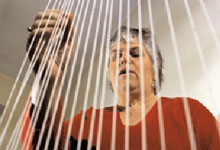A revival of traditional crafts on Arran has brought unexpected benefits to the local community.
Arran Textiles was set up nine years ago by Project Manager Lynn Ross. Offering classes in traditional skills such as spinning, weaving and natural dyeing, the project was initially aimed at women over 50 living in isolated rural communities.
Such was its popularity that the project was extended to include younger women and schoolchildren. It has also produced a successful range of CD-ROM materials for sale and extended training courses to the mainland.
As a result, not only has the Arran Textiles helped people who were previously socially isolated but it has brought the added benefits of new business opportunities and support for tourism.
“It is amazing for us to look back on what started as a textile craft project and to realise just how it has achieved these benefits,” says Lynn. “It has also been hard for us in the past to communicate this success to outside agencies who just assume that we are a wee factory churning out sweaters in Brodick.
“Spinning, weaving and knitting have always been social crafts and I think when people get together to practise them they talk and communicate with each other and exchange ideas. You can really see this in action in our schools programme where the children talk to the older spinners and weavers while they are working together in a way that they wouldn‘t if we just appeared in the room.”
A major initiative for Arran Textiles has been Project Orchil, a three year programme funded by the National Lottery which combined traditional textile skills with modern learning such as business administration and IT.
Planning ahead has been a key element in the project‘s success.
“I would say that marketing is the most difficult aspect of developing a business based on craft skills, especially when it involves products which are traditionally ‘women‘s work’,” says Lynn. “We have concentrated on developing products which are educational, like our packs and our courses, because the actual production of craft goods is not viable on its own.”
Arran Textiles is currently taking part in a European project funded by the Leonardo Da Vinci training initiative which will provide the springboard for its next phase – setting up a ‘centre of excellence‘ for traditional textile studies on Arran, including training, a textile library, a gallery and information technology.
Before the European funding comes through, Social Investment Scotland is providing bridging finance for Arran Textiles – helping to make sure that the project continues to go from strength to strength.
Communities Scotland Web Site.

